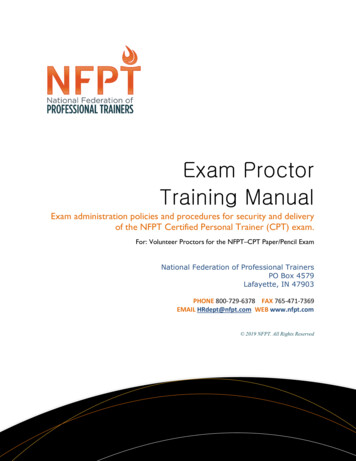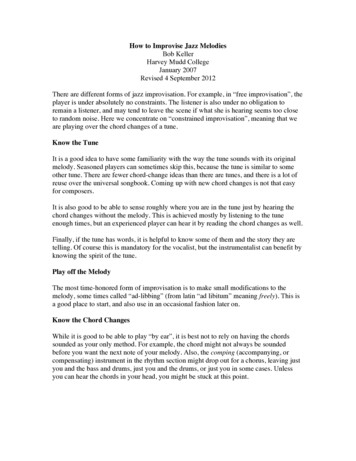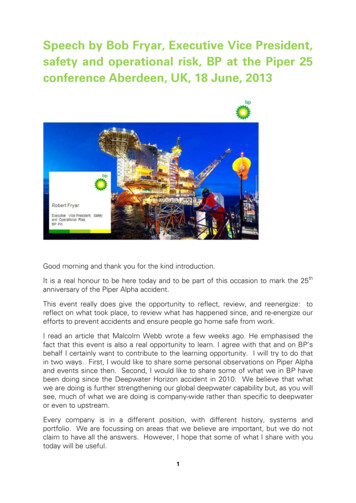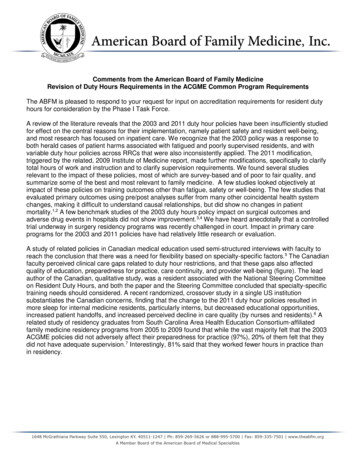![[OFF CAMERA COMMENTS] BOB PROCTOR - ABC News](/img/13/microsoft-20word-20-20proctor-20transcript.jpg)
Transcription
TAPE 1.[OFF CAMERA COMMENTS]CYNTHIA McFADDENWell, thank you for sitting down and talkingto you to us about this.BOB PROCTORMy pleasure.CYNTHIA McFADDENTell me a little bit about making the, the, thevideo of the, the DVD of The Secret. How didthat process work?BOB PROCTORWe just went into a room, or I did – anyway, Ijust went in into a room and sat down and,uh, Rhonda Byrne asked me a few questionsand I started to give her my perception ofwhat she was talking about.CYNTHIA McFADDENHow did, how did she contact you first?BOB PROCTORWell, you know, the, uh, that’s an interestingstory. Uh, she had my cell number and shehad flown in from Australia. And she had thebook that I wrote, You Were Born Rich. Thatwas the only thing she took on the plane. And
so when she got here she wanted me in thismovie. And she had her sister, Glenda, phoneme. But it was such a garbled message onthe phone I couldn’t understand it. And Ididn’t delete it but I didn’t listen to it, either.And I just kept hitting pound and putting itahead. Finally, after about a month, I askedGina, that works with me, I said, Gina, trythis number. I think the name’s Glenda and Ithink this is the number. And she phonedand they said that they really wanted me inthis film that they were shooting. The crewwas in from Australia but they were goingback next week and they were working allweekend in Aspen. And Gina said, That’sstrange. Bob’s doing a program, a seminar,this weekend in Aspen. And I hadn’t been toAspen for two or three years. And I was in thehotel right next door to where they wereshooting.CYNTHIA McFADDENCoincidence?BOB PROCTORWell, there’s attraction again, you see. I just
went in and sat down and went to work andthat was it.CYNTHIA McFADDENYou know, she, she says in, in the book thatthese ideas are not new ideas to her.BOB PROCTOR[OVERLAP] Um hum.CYNTHIA McFADDENIn fact, there were, there were twopossibilities—BOB PROCTOR[OVERLAP] They weren’t new ideas toanybody, really. I mean, they’ve been around.I could show you books that I’ve got, two orthree hundred years old, where they are. You,uh, you go into the Upanishad -- some of themost ancient writings there is – and you’regonna find it. So it’s, anything’s a secret if wedon’t understand it, I suppose. EarlNightingale, in 1959, made a recording, TheStrangest Secret. And the strangest secret isyou become what you think about. Earl was aradio broadcaster – quite a famous one. And,uh, Columbia gave him a gold record for that.
It was the first record outside of theentertainment industry that had sold over amillion copies. Now, that was in 1959. Andthat was a big deal at that time. And now thiscomes out, 2006 or –07, and it’s a big deal.CYNTHIA McFADDENGiven the fact that so many of these ideashave been written about before BOB PROCTOR[OVERLAP] Yes.CYNTHIA McFADDEN-- some of them quite fully by, by you andothers -- why do you think this book hasstruck a chord?BOB PROCTORI think, I really think that the genius is in theediting and the way it was all put together.Uh, uh, I don’t know as anybody else couldhave done it. Rhonda Byrne did it and I thinkthat’s what made it happen. I think she hasan understanding or a way with this that noone’s ever had before. I’ve been in thisindustry for thirty-eight years and I havenever seen anything that will even come close
to this. And I believe the message resonateswith the soul. I think, I believe we’re spiritualbeings. I think spirit’s always for expansionand forward expression. That’s why we wantto do better. If we run we want to run faster.If we jump we want to jump higher. If we sellwe want to sell more. I think that’s part ofour nature. I think there’s perfection withinus and that perfection is always trying toexpress itself. I believe this recordingresonates with the higher side of Cynthia andBob.CYNTHIA McFADDENListen, the marketing didn’t hurt any, either –nor did getting on Oprah.BOB PROCTORWell, yeah, but why did it get on Oprah? Themarketing is all viral marketing. There wasno advertising.CYNTHIA McFADDENWhat do you mean by viral marketing?BOB PROCTORWell, uh, you tell two people, they tell twopeople, they tell two people. It was word of
mouth. There’s been no money spent onadvertising.CYNTHIA McFADDENNo money spent on advertising?BOB PROCTOR[OVERLAP] Um, not to my knowledge, no. Uhuh.CYNTHIA McFADDENSo you’re saying this was a real people’smovement in some ways, the fact it was asuccess.BOB PROCTOR[OVERLAP] Absolutely, absolutely. I think it,I think it gives people what they’re looking. Ifind it amusing that anybody would criticizeit. Do you know, it’s always been around.The law of attraction’s always working. Thefact that we don’t know it is another – That’slike saying the sun’s not shining. The sun’salways shining. You may not see it but it’salways shining. The law of attraction’s alwaysworking.CYNTHIA McFADDENI want to talk specifically about the law of
attraction in a minute. But just, just a coupleof other things about you and, and how shecame to you. And I have a copy of your book,You Were Born Rich. Um, wh wh you’re alecturer and primarily.BOB PROCTOR[OVERLAP] Yes.CYNTHIA McFADDEN[OVERLAP] So talk a little bit about – uh, andyou’re identified in the film as a philosopher.BOB PROCTORWell, I’m not quite sure what a philosopher is.I, I, I read where a philosopher is a personthat seeks the truth through reasoning, uh,versus scientific facts. So I guess you couldsay I am. But I, I see myself as a salesperson. I see myself as a businessman, uh, ateacher. I’ve been teaching seminars now, I’vebeen teaching this material for thirty-eightyears. I love it. I have watched companysales go up by hundreds of millions of dollarswhen people start to understand this.CYNTHIA McFADDENYou have worked with a lot of Fortune 500
companies.BOB PROCTOR[OVERLAP] I have, absolutely.CYNTHIA McFADDENTell, tell me about that.BOB PROCTORWell, I went back, I worked for Prudentialthirty years ago – the, which was the largestinsurance company in the world. And we sawtheir sales go absolutely wild. In fact, theysent psychologists out trying to figure outwhat I was doing. All I was doing wasintroducing the people to them self. See,through our educational system we knowvirtually nothing about our self. We reallydon’t.CYNTHIA McFADDENSo what do you teach? What are you tappinginto?BOB PROCTORUh, I think I’m tapping into the essence of a,of an individual and helping them develop anawareness of who they are, why they’re doingwhat they’re doing. School is, uh, solely
dedicated to the development of the intellect.So you’ve got people out there with a highlydeveloped intellect – bad paradigm, badprogramming – so they’re getting poor resultsand they’re really smart. And they’rewondering, Why am I getting such poorresults? That’s, we’ve got all kinds ofeducated derelicts wandering the street.CYNTHIA McFADDENSo your, your training is not academictraining.BOB PROCTORAbsolutely not. I think academic training isdoing a lot of harm. Academic training iswhere we give people information. If they canremember it and repeat it then they get adegree. But that doesn’t mean that they’regoing to perform. And so we see people withdegrees that don’t know how to perform.They’re, they’re broke or in debt. They’re notoverly happy. They’re extremely frustratedbecause they see someone that they knowisn’t anywhere near as bright as them andthey’re doing so much better.
CYNTHIA McFADDENSo you, you, you were a success before TheSecret. But has The Secret added tobusiness? Is that what has been –BOB PROCTOR[OVERLAP] Oh, absolutely, The Secret’sadded to business. Abso sure. Any kind ofpublicity is always going to add to business.And, yeah, it’s changed our business quite abit. But I’ve been in the business for a longtime. Uh –CYNTHIA McFADDEN[OVERLAP] So, if, if you have to fill it out on aform, you’re in the business of what?BOB PROCTORPersonal growth, personal growth, personaldevelopment, yeah.CYNTHIA McFADDENSo, so let’s go through it very specifically,cause there have been a lot of questionsraised about exactly what The Secret isteaching. I –BOB PROCTOR[OVERLAP] Sure.
CYNTHIA McFADDENI’ve read the book, seen the video and, andtalked to some people. And I’d be –BOB PROCTOR[OVERLAP] I don’t think The Secret’s teachinganything. I think the teach, The Secret ismaking people aware that there is basic lawsthat govern the results we get in life and it’sgiving us lots of examples and thenencouraging us to understand it.CYNTHIA McFADDENSo, so let’s talk specifically. The Secret is BOB PROCTORThe law of attraction.CYNTHIA McFADDENAnd the law of attraction is BOB PROCTORWell, the law of attraction is based on a law ofvibration. You’re, you’re a mass of energy ona high speed of vibration. And the vibrationyou’re in is controlled by the images that arein your mind, that are fixed in your mind orthe thoughts that you’re thinking. And thecontrols the vibration you’re in. That dictates
what you’re going to do. It also dictates whatyou attract to you. You’re not going to attractsomething to you that you’re not in harmonywith.CYNTHIA McFADDENNow, do you mean literally attract?BOB PROCTORAbsolutely, just like a magnet. You felt – well–CYNTHIA McFADDEN[OVERLAP] But I thought, I thought magnetsattracted their opposite.BOB PROCTORWell, magnet’s complete a chain.CYNTHIA McFADDENOkay.BOB PROCTORIt, it keeps a circle going. And, but if a personis very positive they’re not going to feelcomfortable around people that are verynegative, are they? They’re going to berepelled from them. They’re going to beattracted to other people who are verypositive. Like attracts like. You’ll find poor
people all living in the same neighborhood.You’ll find wealthy people all live in the sameneighborhood. They’re attracted to situations.CYNTHIA McFADDENYeah, but poor people can’t afford to live inthe wealthy neighborhoods and the wealthydon’t want to live in the poor neighborhoods.BOB PROCTOR[OVERLAP] Well, that, that’s, that’s theobvious answer but that isn’t the real answer.You’re going to find that almost all people inpoor neighborhoods are fourth, fifthgeneration welfare recipients. And that isbecause this thinking has been passed alongin the genes. It’s a genetic conditioning. It’snot only genetic. It’s environmental. Whenyou arrive on the scene why do you think youlook so much like your relatives? Do youthink it’s an accident? It’s all programming.It’s genetic programming. And then afterbirth we’re conditioned by our environment.Carl Menninger, from the MenningerFoundation, years ago said that environmentis more important than heredity. If you were
born into a home where Chinese was spoken,although you may not be Chinese, you’regoing to speak Chinese.CYNTHIA McFADDENOkay, but let’s go back to the law of attractionto make sure I understand this. You’resaying, I mean, uh, in fact, the, the book saysit at, uh, various points. Thoughts becomethings.BOB PROCTORUltimately. But you see, someone will hearthat thoughts become things and they’ll say,Well, that isn’t really true. It is true. Now, it’salso said you can go into scriptures and you’llfind, As a man thinketh in his heart. Theheart is what the early Greeks referred to asthe subconscious mind. You don’t becomewhat you think about. You become what youthink about and internalize. It’s the thoughtsthat you’re emotionally involved in thatultimately will manifest in your life.CYNTHIA McFADDENSo, then, when it says, uh, Once you let theuniverse know what you want the universe
will deliver it.BOB PROCTORAbsolutely.CYNTHIA McFADDENExplain.BOB PROCTORWell, everything’s already here. Nothing’screated or destroyed. There’s only twoser two references to go to to find outanything about our self -- one’s science andthe other’s theology. And both of them clearlyindicate that nothing’s created or destroyed.Everything’s already here. Like, the way tobuild the internet was always here. It tookthe idea in someone’s mind before we startedto have the benefit of it. Everything is alreadyhere. As we build ideas we start to attractwhatever’s required towards that idea for it tomove into form.CYNTHIA McFADDENSo you, you say at one point, If you thinkabout debt you attract debt.BOB PROCTORAbsolutely. And that’s why you’ll find people
that hear, You should set goals. So they set agoal to get out of debt. That’s a good way tostay in debt. If your goal is to get out of debtor get in debt it doesn’t matter. If you’rethinking debt you’re going to attract debtbecause that’s what you’re focused on. I usedto be in debt. I earned four thousand dollarsa year and I owed six when I first started tostudy this. And all I thought about was debt.And I read Think and Grow Rich. And he said,Decide what you want and write it on a card.All I wanted was money. I thought if I hadenough money it would solve all my problems.Now, of course, that wasn’t correct. But Iwrote on a card that I wanted to have in mypossession twenty-five thousand dollars byNew Year’s Day of 1970. I gave myself adecade to do it. But I started to read thatcard. The book said, Read it over and overand over again. I felt a little silly doing it but Idid it. And that got me thinking of earningmoney. Now, if you’re thinking of earningmoney you’re not thinking of debt. You’ll say,Isn’t that the same thing? No, they’re polar
opposites. It’s like inside and outside. Andbecause I was thinking about it I started tohear people talking about it. [PAUSE] Toexplain all this in depth, Cynthia, in, in ashort interview is, uh, is not the easiest thingto do.CYNTHIA McFADDEN[OVERLAP] Well [UNCLEAR]BOB PROCTOR[OVERLAP] But anyone that studies it has toarrive at the conclusion that this is allaccurate.CYNTHIA McFADDENUh, you, you have said, and the book suggeststhat, that in fact, this is all scientificallybased. Is that –BOB PROCTOR[OVERLAP] Um hum.CYNTHIA McFADDENIs that right?BOB PROCTORSure.CYNTHIA McFADDENThat the, the law of attraction is, it is based
on science -- that these thoughts havevibrations, that the vibrations can becalibrated, that positive thoughts vibrate sixtythousand times, I think, um, stronger thannegative thoughts.BOB PROCTOR[OVERLAP] Yes, um hum.CYNTHIA McFADDEN[OVERLAP] Is that all, is that accurate?BOB PROCTOR[OVERLAP] Yes, yes, listen -CYNTHIA McFADDEN[OVERLAP] Explain, but you, you explain it tome.BOB PROCTOR[OVERLAP] Well, well, Dr. Werner von Braunwas, who we considered the, uh, father of thespace program, he – and, and I quoted it onthe film. He said that the natural laws of thisuniverse are so precise that we don’t have anydifficulty building space ships, sending peopleto the moon and we can time the landing withthe precision of a fraction of a second. Now,what are these laws? He also said these laws
must have been set by someone. I think thelaw is God’s modus operandi. I think this isthe way the universe operates. Vibration isone of the laws. Everything vibrates, nothingrests. We literally live in an ocean of motion.And we control the vibration or can. Let’s saywe, we can. We don’t necessarily do it. Ourbrain is an electronic switching station. Andby thinking ideas you are activating braincells which alters the vibration you’re in. Andwhen you do that you start changing the wayyou behave and you also change what youattract to you. I have watched this happen inmy own life over the past forty-five years. Butthere’s so many examples that it’s, uh, it, it’sa puzzle to me how people miss it.CYNTHIA McFADDENGive, give me a good example from your own BOB PROCTORWell, a good example is, I had no formaleducation. I had no business experience,absolutely none. I had a bad attitude and,uh, I was unhappy and in debt. Today I amhappy, I’m healthy, I’m wealthy. I’ll be
seventy-three on my next birthday. I’ve gotmore energy than most people twenty-three. Ihave business all over the world. I have nodifficulty earning money now because Iunderstand how to do that. And that’ssomething most people never understand.And I have attracted beautiful people into mylife all over the world. And that has become, Ihave become a beautiful person. I’ve, and Idon’t mean that in an egotistical sense. Imean that in a real sense. I’ve started tounderstand who I am. And this is somethingthat Rhonda Byrne understood. And that’swhat’s built into this film. And that’s why it’sgaining such momentum. People want this.CYNTHIA McFADDENYou know, one, one of the things it says in thebook – and I, and I understand that, that thisis, to, to reduce it to just phrases –BOB PROCTOR[OVERLAP] Sure.CYNTHIA McFADDEN has a disservice. But in some ways we canonly talk about the phrases that we have
[UNCLEAR]BOB PROCTOR[OVERLAP] Well, I think that’s one of theproblems in the film, is that some of it hasbeen reduced to a phrase.CYNTHIA McFADDENBecause I just am looking for the – if it’s –[OFF CAMERA COMMENTS]So, so ask, believe, receive. Uh BOB PROCTORWell, that is accurate. If you ask forsomething and you believe you’re going to getit, you’re going to receive it. However, there’s,I think there’s some understanding requiredthat goes deeper than just ask, believe andreceive. First of all, most people don’t believeit. They ask for it and they wish for it andthey don’t believe it’s going to happen. And ifyou don’t believe it, it’s never going to happen.We’ve gotta believe it. Our belief is basedupon our evaluation of something. And as were-evaluate our self, our belief about our selfand what we’re capable of doing has changed.
If you just go back in your own life – I don’teven have to ask you anything about it – thathas happened in your life. As we gain agreater awareness we start to believe we cando different things so we start asking fordifferent things.CYNTHIA McFADDEN[OVERLAP] [INAUDIBLE]BOB PROCTOR[OVERLAP] Our belief is altered.CYNTHIA McFADDENThen we have to open our self up to receive it.Some people don’t know how to receive good.We should willingly give and graciouslyreceive. We are, are instruments that goodcycles through. We’re not supposed to get itand hold it. We’re supposed to keep itcirculating.CYNTHIA McFADDENBut what, we have to do something, don’t we?BOB PROCTORAbsolutely, we have to do something. If wejust sit there and think it’s going to happen bysitting and thinking about it we’re going to be
taken away to a place with guys in white coatswhere those things happen. You gotta get outand do something, absolutely.CYNTHIA McFADDENBecause one of the – I think, I mean, inwatching the video, in, in reading the book,one of the messages I came away with is if youthink it, ask for it and truly believe it, it willcome to you. There’s nothing discussed abouthard work.BOB PROCTORWell, first of all, I think working is the worstway to earn money. And, and, uh, and thisdeals a lot with money. That sort of drawsyou back.CYNTHIA McFADDENIt does.BOB PROCTORWell, there’s a lot of people that you go towork to earn money. You should not go towork to earn money. You should go to workfor satisfaction. And because people thinkyou go to work for, to earn money there’s a lotof people going to jobs they just absolutely
detest because of the money. We earn moneyby providing service, not by working. Weshould work for satisfaction. We shouldspend our days doing what we love.CYNTHIA McFADDENBut for example, in the, in, in the video, uh,you go to the mail box. This is visualizing inthe movie.BOB PROCTOR[OVERLAP] Sure.CYNTHIA McFADDENYou go to the mail box. It’s bills, bills, bills.You go to the mail box, you expect a checkand you get a check. Now, how does thatwork?BOB PROCTORWell, I, I’m not quite sure, you know. Uh, uh,uh, I don’t think it happens just like that. Uh,I do think you have to shift your thinking.Because I was getting bills, bills, bills. And,but it took some time. Uh, you don’t changeyour thinking overnight. I changed mythinking really dramatically probably over ayear. And it was through the repetition of
ideas. I was listening to a long playing record-- I drove around listening to it -- for a goodyear, of Earl Nightingale’s. And, and I justkept listening. And what I did, it took me nineyears to figure out what I had done. Ireprogrammed my mind. And when you dothat you’re going to find that the bills start togo away and the revenue starts to flow in.CYNTHIA McFADDENBecause what? Because the universe sends itto you?BOB PROCTORWell, the universe is sending you the bills.The universe is sending you the good. Theuniverse sends everything to us. If nothing’screated or destroyed, everything’s already hereand the universe sends us what we’re inharmony with.CYNTHIA McFADDENSo –BOB PROCTOR[OVERLAP] If we’re in harmony with debt andbills, we’re going to get them.
CYNTHIA McFADDENAnd if we’re in harmony with disease?BOB PROCTORYou’re going to get it. If your body is in ahealthy vibration disease can’t stay there.Now, we hear people say, Well, we just have tothink and then we can get our, get rid ofcancer. I don’t know, I don’t know anybodythat says that. I certainly don’t say that. Ithink if there’s something wrong with the bodyyou go to somebody that understands thebody and take treatment for it. But I think atthe same time you start to say, change yourthinking. In Dr. Seigel’s book, um, Love,Medicine and Miracles, he gets into that inquite, in, in, in a lot of depth.CYNTHIA McFADDENBut let me ask you about this specifically,because there’s, there has been a good deal ofcriticism –BOB PROCTOR[OVERLAP] Yeah.CYNTHIA McFADDEN about this part of the DVD. Uh, uh, a
woman gives a testimonial in which she saysshe was diagnosed with breast cancer, thatshe –BOB PROCTOR[OVERLAP] Um hum.CYNTHIA McFADDEN believed she was healthy, thought of herselfas healthy, watched amusing video tapes –BOB PROCTOR[OVERLAP] Um hum.CYNTHIA McFADDEN of movies and that she was cancer-freewithin three months without any form oftreatment. Now, do you believe that?BOB PROCTORI believe that’s happened to a lot of people. Idon’t know the woman. I don’t know thatsituation. So I couldn’t comment on thatsituation. But I think there’s a lot of people,when they go back to the doctor, the doctor’sastounded. He said, I don’t know whathappened but it’s not there.CYNTHIA McFADDEN[OVERLAP] Without treatment?
BOB PROCTORIf you, what we should do is get all kinds ofdoctors in for memory or some of these, uh,uh, cancer hospitals and ask them, Does thishappen? I think it happens often. We justdon’t hear about it and we don’t understandit.CYNTHIA McFADDENYeah.BOB PROCTOR[OVERLAP] And anything we don’tunderstand we have a tendency to criticize orridicule. That particular woman, I don’t knowher. I don’t understand the situation.CYNTHIA McFADDENBut you believe in principle that that’spossible.BOB PROCTORI do, I absolutely do. I absolutely do. I thinkyou can change the vibration you’re in. Andwhen you change the vibration you’re inyou’re casting off about fifty million cells persecond as we’re sitting here talking. Andyou’re recreating new ones. The body’s going
through a change. The body you’re sitting inthere now isn’t going to be the body you’resitting in a year from now. It’s in a constantevolution of change. You can evenphotograph the energy leaving your body.Semyon Currian [PH] perfected that in Russiaway back in the early Thirties. But we don’tunderstand it so what do we do?CYNTHIA McFADDENI want to talk about both those things. But goback with me just a moment. Uh, as we saidbefore we sat down –BOB PROCTOR[OVERLAP] Sure.CYNTHIA McFADDEN that we have lots of conversations going.BOB PROCTOR[OVERLAP] Um hum, yes.CYNTHIA McFADDENUm, let’s go back to the cancer si situation.So, uh, I, I, I understand we can’t speak to theparticular woman in this. But in theory theidea that you can, you can be healthy by, bytruly believing in it, by, by asking for health
and believing in your own health.BOB PROCTOR[OVERLAP] Yes, yes.CYNTHIA McFADDENI spoke yesterday with the President of theAmerican Cancer Society.BOB PROCTORYes.CYNTHIA McFADDENHe said he finds this alarming. Uh BOB PROCTORI would find it alarming, too, if that’s as far asit went. But I’m sure if you spoke to thePresident of the Cancer Society and askedhim, Should a person image perfect healthwhile the doctor is treating the body?, I thinkhe would say, Absolutely.CYNTHIA McFADDENWell, but the problem is –BOB PROCTOR[OVERLAP] But I don’t say you should rejectphysical treatment or, or, uh, or therapy. Iwouldn’t say that.
CYNTHIA McFADDENYou wouldn’t say that?BOB PROCTOR[OVERLAP] Absolutely not.CYNTHIA McFADDEN[OVERLAP] The video seems to suggest,though, that that is a way –BOB PROCTOR[OVERLAP] Well, that might, that might beimplied. But I think, I don’t think that’sRhonda Byrne’s suggestion. It’s certainly notmine. If I was diagnosed with cancer I’d bethe first to go and I would take whatevertreatment they gave me. I would startworking on my mind myself. And if you askedRhonda Byrne she would tell you the samething. I know the woman well. The criticismof her is very unfair.CYNTHIA McFADDENSo, but I’m perplexed. Why put thattestimonial in this DVD? Because that’s –BOB PROCTOR[OVERLAP] I don’t know.
CYNTHIA McFADDEN what a lot of people have latched onto.BOB PROCTORYes, and I don’t know why she put it in. Ididn’t make it and I haven’t asked her.CYNTHIA McFADDENFrom where you sit would you prefer that itweren’t there?BOB PROCTORProbably, yes.CYNTHIA McFADDENLet me ask you about another example thattroubles me.BOB PROCTORBut, but, Cynthia, I, I would also say that thefact that it’s there it’s causing a lot of peopleto think about it and so it’s gonna cause a lotof people to do some research and, and they’regonna find some things that they don’t know.CYNTHIA McFADDENWell, in fact, uh, the President of theAmerican Cancer Society says there isabsolutely no evidence that we bring cancer,disease on ourselves. There is absolutely no
evidence for that scientifically.BOB PROCTOR[OVERLAP] Um hum, um hum.CYNTHIA McFADDEN[OVERLAP] What do you say to that?BOB PROCTORWell, I think he’s, I think he’s inform not wellinformed in this area. I mean, I, I just don’tbelieve it. If we go back, um, the medicinethat we’re taking is causing more problemsthan it’s eliminating. Look at the drugs, theonly drugs that are outlawed today are theones the parents don’t take. Houses are fullof this stuff.CYNTHIA McFADDENBut, but he’s saying, uh, uh, uh, I mean, I, Iread him a couple of the things that you hadsaid. Let me, I’ll, uh, so we can talkspecifically. Let’s see. [PAUSE] Oh, okay,hold it. Let me get to the health part. Um,you say on the video, Disease cannot live in abody that has a healthy emotional state. Yourbody is casting off millions of cells everysecond and, and creating millions of new cells.
If you have a disease and you’re focusing on itand you’re talking to people about it, you’regoing to create more disease cells.BOB PROCTORI believe that’s true.CYNTHIA McFADDENNow BOB PROCTORYou’re giving energy to it. Emerson said theonly thing that can grow is a thing you giveenergy to.CYNTHIA McFADDENHe, he says, There’s absolutely no scientificevidence that people attract – [INAUDIBLE]BOB PROCTOR[OVERLAP] He’s studying disease. He shouldstudy health. I don’t think he’s studyinghealth at all. I think, I think he’s studyingdisease. What about all the preventativemedicine that’s going on today? There’s anenormous movement worldwide taking placein that area. That’s, it’s a, the pharmaceuticalcompanies are trying to shut it down.
CYNTHIA McFADDENSo you’re saying literally, If we have cancer wehave thoughts that bring us the cancer?BOB PROCTORWell, I don’t think a person gets cancer causethey’re thinking of getting cancer. I, I haveread different things where a lot of cancer iscaused by suppression. People are, aresuppressing their energy and there has to –CYNTHIA McFADDEN[OVERLAP] But you’re saying that it’s athought can cause it – uh, uh, whatever thethought might be but the thought can causecancer.BOB PROCTOR[OVERLAP] Well, I, I believe, I believethought’s the preamble to everything.[PAUSE]CYNTHIA McFADDENSo when little children get sick with somedread disease it’s their thoughts?BOB PROCTORWell, no, I don’t think it’s the child’s thoughts.I think a lot of that is passed along
genetically. I think it’s from the environmentthat the child’s in. The child’s subconsciousmind is wide open. But in answer to some ofthose questions, I, I, I was asked about to doforeign and different things, I don’t know theanswer to that. I don’t know the answer to9/11. I, there’s a lot of things I don’t know.But there’s some things that I do know, that Ilive by and it works very well for me and thepeople that I teach it to.CYNTHIA McFADDENSee, one of the things this, uh, cancer doctorsays is that he has treated lots of people whobelieved that they were sick, believed theywere going to die and still got well. How doyou explain that?BOB PROCTORI don’t know. I don’t know. But I do knowthat, uh – Let, let’s take Mazlo.CYNTHIA McFADDENWho?BOB PROCTORThe doctors are studying disease. Mazlo said,Wait a minute. Uh, Pavlov is, uh, studying,
uh, dogs, uh, uh, uh, and it goes, somebodyelse is studying sick people. He started tostudy the healthiest specimens he could find.If we want to study health, let’s study the realhealthy specimens. And I don’t think that’sbeing done by a lot of the medical profession.I don’t know the answer to some of thesequestions, Cynthia, but I do know that yourthoughts control the vibration you’re in andthe vibration you’re in’s gonna dictate whatyou attract – not just in for a few minutes, butthe one you’re in most of the time. We’reparadigms. We’re conditioned to be the waywe are. And we can change that conditioning.CYNTHIA McFADDENSo you’re saying these vibrations, though, arescientifically provable.BOB PROCTORYou can measure it, absolutely. You canmeasure the energy coming from a person. Aperson changes their
book that I wrote, You Were Born Rich . That was the only thing she took on the plane. And . so when she got here she wanted me in this .




![[EPUB ] The Bob's Burgers Burger Book: Real .](/img/6/the-bob-039-s-burgers-burger-book-real-recipes-for-joke-burgers.jpg)






